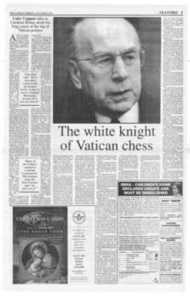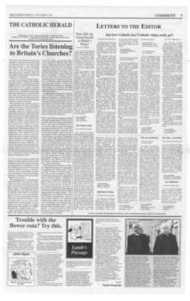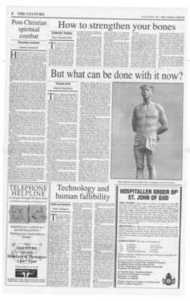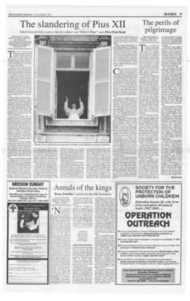Page 8, 8th October 1999
Page 8

Report an error
Noticed an error on this page?If you've noticed an error in this article please click here to report it.
Tags
Share
Related articles
Challenge To Bbc Over Book Allegation
Getting To Know You: The Only Way
In Defence Of Von Balthasar
Feeding A Vulture Culture
The Call Of The Pied Piper Shooting The
Post-Christian spiritual combat
Counter-culture
Leonie Caldecott
HARRY ParrER has made it onto the cover of Time magazine. The "runaway best-seller" has been as successful in the US, it seems, as in its native country. Meanwhile the Evening Standard last week reported that the Potter books have been banned in classrooms in some areas of the US on account of the witchcraft and wizarding content.
What a relief then, to see that Anthony Tyler, the Master of the Keys (the Catholic Writer's Guild), has given my child's favourite hero the thumbs up. In this week's edition of the Keys newsletter, Tyler praises J K Rowling's creation for its depiction of the struggle between good and evil, and the necessity of cultivating the virtues. I concur with his judgement. In a market saturated with sinister writers such as Roald Dahl and Philip adman (of whom more another time), Rowling's upbeat modem classics are a welcome breath of fresh air.
In case you still don't know what the Harry Potter books are all about (the third book in the series was published this summer), they can roughly be described as Enid Blyton meets C S Lewis via Sabrina the Teenage Witch. An orphaned boy called Harry, stranded with his truly terrible uncle and aunt in a soul-destroying suburbia, discovers at the age of 11 that he is able to attend the wizarding school, Hogwarts, which his parents attended before him. In the process of doing this, he discovers the wizarding world, which exists in hiding alongside the ordinary one, whose non-magical inhabitants are known as "muggles". Once Harry has boarded the mysterious train on platform nine and three quarters at Kings Cross, life is never the same again. He learns everything from how to make potions to how to defend himself against practitioners of "the dark arts".
All the books take place in a completely post-Christian universe. This confronts us head-on with the fact that the generation for whom they are written do not speak with a Christian vocabulary. Nonetheless, Rowling's books are profoundly realistic about the nature of spiritual combat: confrontation with the forces of darkness is taken seriously, and the issues are very clear. An important premise of the struggle is the fact that the young Harry was invested with so much love by his mother when she died to save his life that the evil adversary Voldemort (get it?) cannot touch him except by... well you'll have to read the books to find out (there are special editions with plain covers for adults who don't want to feel self-conscious reading them on the train).
It is always a conundrum when we try as Catholics to assess the effect of books about magic and sorcery on our children.
There is no doubt, as Michael O'Brien points out in Landscape with Dragons, that most modem authors and film-makers do not respect Judaeo-Christian ideas on the subject of evil. It is also a fact that the youth market is glutted with witches and an obsession with the paranormal. Yet even Christian writers such as Lewis, MieDernald, Tolkien, Williams and L'Engle make liberal use of magic.
Lewis never makes an explicit reference to Christianity, though the drama at the heart of The Lion, the Witch and the Wardrobe expresses its central truth. Likewise, a guiding principle in the Harry Potter books, thus far at least, is that self-sacrifice on the part of the hero has a redemptive value in the confrontation with absolute evil.
It remains to be seen how J K Rowling handles the criticism of adolescence. Each book deals with a new year at Hogwarts, and in the next volume Harry and his friends will turn 14. But so far her creations are sublime, with just the right combination of realism and fantasy, fear and reassurance. It is hard to imagine the world of children's books without Harry. I dare say we'd muggle along without him, but it would be a shame.
blog comments powered by Disqus













